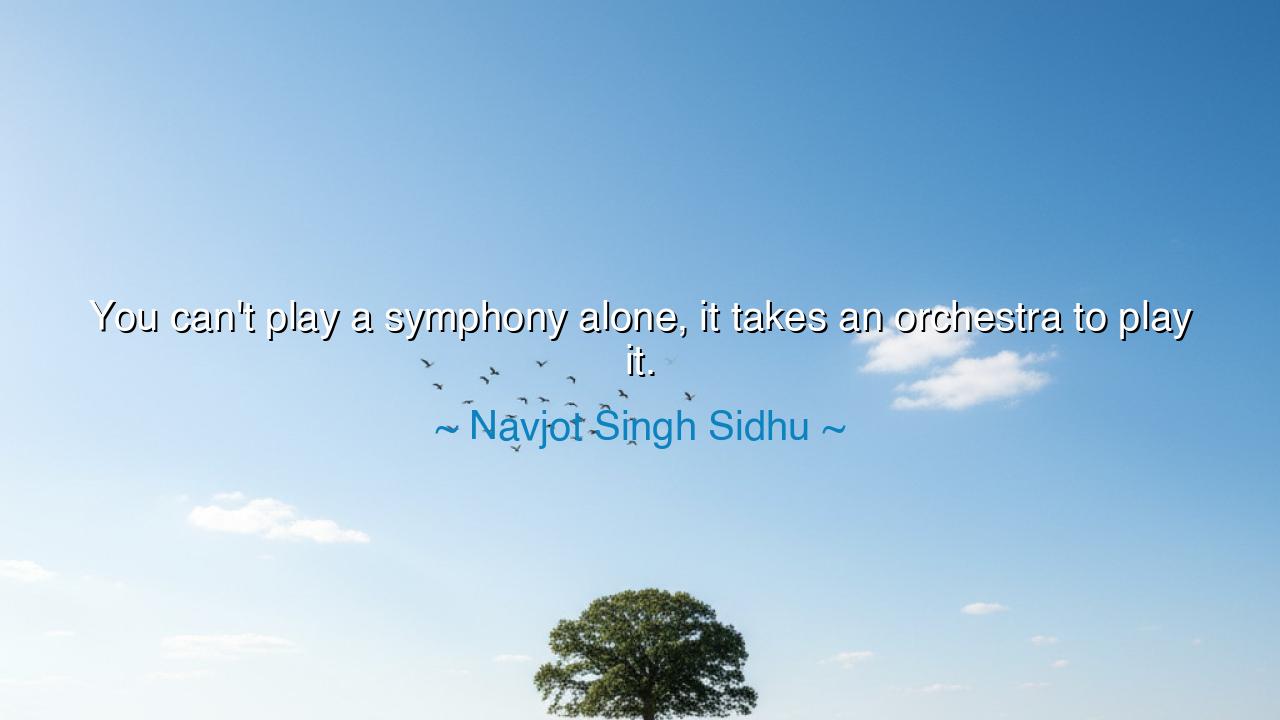
You can't play a symphony alone, it takes an orchestra to play






"You can't play a symphony alone, it takes an orchestra to play it." These powerful words by Navjot Singh Sidhu echo a truth that has resonated through the ages: no great endeavor can be accomplished in solitude. Like the delicate balance of the strings, wind, and percussion that create the harmony of a symphony, the greatest achievements of humankind are not the work of one person, but the result of collaboration, unity, and shared vision. Sidhu’s metaphor of the orchestra highlights that while individual brilliance may shine, it is the collective effort, the unity of many parts, that brings the full depth and resonance to any grand undertaking.
In the ancient world, the importance of community and collaboration was widely understood. The Greek philosophers, especially Aristotle, spoke of the polis (the city-state) as the highest form of human organization, one that was founded on the idea that individuals could achieve greater virtues and greater wisdom when working together. The philosopher’s dialogue was not one of isolated thoughts, but a conversation—a collaborative effort to arrive at truth. It was the interplay of different ideas, like the different instruments of an orchestra, that created the harmony of wisdom. The notion that greatness is achieved in unity runs through ancient texts, where the works of heroes, be they in battle, art, or philosophy, were not achieved in isolation, but in concert with others.
Similarly, Plato, in his ideal vision of the Republic, saw the state as an orchestra of the soul, where each person played their part according to their natural abilities. A just and harmonious society could not be built by selfish ambition or individual striving alone. It was only when all citizens, from the rulers to the workers, played their role that the society could flourish. This metaphor of a well-played orchestra is a reminder that the most noble goals—whether in politics, art, or human relations—are best achieved through the collaboration of many, each contributing their unique strengths for the common good.
In the realm of history, the rise of great civilizations often depended not just on the vision of one leader but on the collective effort of a people united in purpose. Consider the Roman Empire, where the military, the citizens, and the ruling class all contributed to the empire’s vast reach and strength. Julius Caesar might have been a brilliant military strategist, but it was his ability to unite people—each playing their part in the empire’s grand design—that allowed Rome to become a dominant force in the ancient world. The Roman legions, the engineers, the architects, and the statesmen all played a role in the empire’s success, much like an orchestra where the instruments must come together to create the symphony.
The lesson in Sidhu’s words also brings us to modern life, where the power of teamwork and collaboration is as essential as it ever was. Whether in business, sports, or community efforts, the success of any major project is the result of many working toward a shared goal. In the world of sports, for example, the greatest teams—whether in football, basketball, or cricket—do not rely on a single star player but on the synergy of the entire team. The 2011 Indian cricket team, which won the World Cup, was not a team driven by one player but by a collective effort of individuals each contributing their own skills and talents. Each player, from the captain to the batsmen, bowlers, and fielders, was a unique instrument in the orchestra that led to their triumph.
The true power of any endeavor lies in unity. We must recognize that while individual talent is important, it is the ability to collaborate, to come together as a team, that creates the full harmonic potential of human achievement. Sidhu’s metaphor reminds us that even in our personal lives, we must surround ourselves with those who complement our strengths and support our weaknesses. Solitude may provide us with clarity and focus, but it is in partnership that we find the true richness of experience and growth. Whether in our families, our friendships, or our careers, the collective effort we put forth is what shapes the world around us.
Thus, the lesson from Sidhu’s words is one of profound humility and wisdom: true greatness lies not in individual achievement, but in the power of collaboration. Seek harmony in your life, and know that the greatest successes will be the result of your ability to work together with others toward a shared purpose. Just as the symphony requires the combined efforts of all its parts to create music, so too do we need the contributions of many to create the full richness and beauty of life. Let us embrace our roles in the greater orchestra of life, knowing that only through unity can we achieve the harmony of true greatness.






AAdministratorAdministrator
Welcome, honored guests. Please leave a comment, we will respond soon